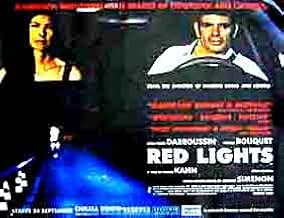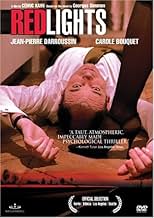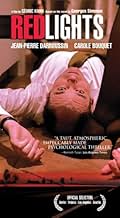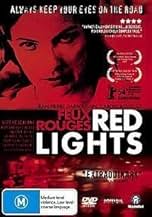AVALIAÇÃO DA IMDb
6,6/10
3,1 mil
SUA AVALIAÇÃO
Adicionar um enredo no seu idiomaA cross-country trip turns out to be a nightmare for a troubled couple.A cross-country trip turns out to be a nightmare for a troubled couple.A cross-country trip turns out to be a nightmare for a troubled couple.
- Direção
- Roteiristas
- Artistas
- Prêmios
- 2 indicações no total
Avaliações em destaque
After "L'ennui", this was the second Cédric-Kahn-movie I have seen, and I found it great. Kahn proves himself a specialist on ridiculous men lacking self-confidence and absolutely inapt to retain some dignity in a modern world like this.
The thriller plot, as stated by some earlier commentators, may be a little weak, especially as regards the "man on the run" (he is obviously taken directly from the Simenon novel but his character is neither fish nor foul). But this is not what it is all about. The thriller plot is merely an excuse to give a touching and disturbing portrayal of character Antoine (and his marriage).
Let me answer to two of the "plot holes" discovered by two other commentators: Antoine's drinking does make sense; he drinks because of frustration and a minority complex for not feeling man enough in the presence of his successful wife. His drinking is a childish act of defiance, he is not a sensible grown-up, not a man (as he keeps repeating himself). And of course, he doesn't recall all these telephone numbers from his memory; as indicated with one of the first calls, he calls directory inquiries and has himself connected to the respective partner each time (remember, there is cuts between the various calls).
Red Lights is a brilliant character study concealed as a masterpiece of suspense. Darroussin gives a touching performance in his role as hero and anti-hero at the same time. He is not particularly likable but still makes us feel sorry for him.
The ending, which I am not going to reveal here, is stirring in a very subtle way because above all it raises the question how it is all going to go on.
I like stories in which weird things happen out of character logic. This is a particular successful one.
The thriller plot, as stated by some earlier commentators, may be a little weak, especially as regards the "man on the run" (he is obviously taken directly from the Simenon novel but his character is neither fish nor foul). But this is not what it is all about. The thriller plot is merely an excuse to give a touching and disturbing portrayal of character Antoine (and his marriage).
Let me answer to two of the "plot holes" discovered by two other commentators: Antoine's drinking does make sense; he drinks because of frustration and a minority complex for not feeling man enough in the presence of his successful wife. His drinking is a childish act of defiance, he is not a sensible grown-up, not a man (as he keeps repeating himself). And of course, he doesn't recall all these telephone numbers from his memory; as indicated with one of the first calls, he calls directory inquiries and has himself connected to the respective partner each time (remember, there is cuts between the various calls).
Red Lights is a brilliant character study concealed as a masterpiece of suspense. Darroussin gives a touching performance in his role as hero and anti-hero at the same time. He is not particularly likable but still makes us feel sorry for him.
The ending, which I am not going to reveal here, is stirring in a very subtle way because above all it raises the question how it is all going to go on.
I like stories in which weird things happen out of character logic. This is a particular successful one.
Red Lights is like a bad dream you might have if you nodded off over the wheel during a long car journey, with the roar of the motorway and the crunch of tyres on gravel seeping into your subconscious. It's so ambient, it would work just as well as a radio play. En route to collecting their kids from summer camp, 'married alive' couple Antoine (Pierre-Darroussin) and Helene (Bouquet) bicker in the car, as Antoine accuses her of cramping his style. The only way this sad little man can assert himself is to pull over and slug whisky after whisky in every roadside bar. When his furious wife bails out to catch the train instead, it's the start of one of those Long Dark Nights of the Soul for both parties. 'I got sick of playing the good little doggie', Antoine tells his mysterious hitchhiker, in one of the movie's most memorable exchanges. 'You're like my doggie,' sneers his passenger. 'Always thirsty.' 'Where's your dog?' 'He's dead
' Based on the Georges Simenon novel, here's a dark little number, blackly comic, and as searing as the red neon lights that accompany each pit stop on the road to Hell.
Red Lights is a strange, abstract, almost existential exercise in movie making. Adapted from the 1953 novel by Georges Simenon and set to Debussy's elegantly creepy Nuages, writer-director Cedric Kahn offers up movie with attributes of a Hitchcockian suspense thriller.
The feeling of foreboding begins immediately when we meet Antoine Dunant (Jean-Pierre Darroussin a low-level insurance executive. He's just leaving his job to meet his beautiful wife Hélène (Carole Bouquet) in a local café. They are planning to drive to the countryside from Paris to pick up their kids from summer camp.
But as soon as Antoine gets to the café he guzzles three beers back to back with one eye on the street lest his wife arrive before he's suitably fortified. It soon becomes pretty obvious that their marriage is far from happy - Antoine armed with enough drink to sink an elephant, settles into a manner of truculent impetuosity, while Helene remains detached, cold, and almost abusive.
While in the road, Helen discovers that her husband is utterly plastered. She hardly says anything as he weaves all over the road, but her silence speaks volumes. Thus starts a trip of barely controlled hostility with the husband clenching the wheel and brooding, while the wife fumes beside him. Both are so busy bickering with each other and thinking dark thoughts that they're half oblivious to news reports of an escaped convict on the loose nearby.
Antoine isn't usually a drinker, but something has snapped in him, and as the neon signs of the roadside bars start to beckon him, he becomes obsessed with downing as much cold beer and whisky as he can. He leaves Helene angrily waiting in the car while he goes into yet another bar, to prepare himself for the long night ahead.
Hélène, freaked by his increasing belligerence and inability to drive in a straight line, abandons her husband to look for a train station. Meanwhile Antoine strikes up a conversation with a reserved one-armed stranger (Vincent Deniard).
When, minutes later, the stranger steps out of the parking-lot shadows, his face half hidden by the hood of a sweatshirt, and asks for a ride, the cocky, staggering Antoine doesn't even break stride. By now he's so sweaty and drunk that he waves the fellow right into the car.
What follows is detour into a night of terror for Antoine, Helene, and for the viewer. The movie starts to resemble everyone's nightmare - the inexplicable disappearance of a loved one. And as Antoine embarks on a desperate journey to track his wife down, it soon becomes clear that Red Lights is really showing us a portrait of a marriage, a marriage that has been enigmatically hanging by a thread.
Their need to see the children again is probably just a way of distracting them from the aridness of their relationship. She's beautiful and accomplished, while he plain and dull. Somehow the couple began their marriage as equals, but she soon eclipsed him, for which he can't forgive her. Other than this, Kahn provides very little reason as to why their relationship has suddenly gone sour.
What Kahn does provide, however, is the knowledge that marriage can often dissipate completely, leave two strangers in a car, totally sick of each other, in desperate need of a reviving shock to the system. But when the sun finally rises, and Antoine is released from his drunken hell, Kahn does provide a dash of hope for the couple.
In the end, Red Lights is showing that relationships are frail and that the machinations of marriage are often inexplicable. And if nothing else, Antoine and Helen show that it can all dramatically and irrevocably change and fall apart in a searing flash of red light. Mike Leonard September 05.
The feeling of foreboding begins immediately when we meet Antoine Dunant (Jean-Pierre Darroussin a low-level insurance executive. He's just leaving his job to meet his beautiful wife Hélène (Carole Bouquet) in a local café. They are planning to drive to the countryside from Paris to pick up their kids from summer camp.
But as soon as Antoine gets to the café he guzzles three beers back to back with one eye on the street lest his wife arrive before he's suitably fortified. It soon becomes pretty obvious that their marriage is far from happy - Antoine armed with enough drink to sink an elephant, settles into a manner of truculent impetuosity, while Helene remains detached, cold, and almost abusive.
While in the road, Helen discovers that her husband is utterly plastered. She hardly says anything as he weaves all over the road, but her silence speaks volumes. Thus starts a trip of barely controlled hostility with the husband clenching the wheel and brooding, while the wife fumes beside him. Both are so busy bickering with each other and thinking dark thoughts that they're half oblivious to news reports of an escaped convict on the loose nearby.
Antoine isn't usually a drinker, but something has snapped in him, and as the neon signs of the roadside bars start to beckon him, he becomes obsessed with downing as much cold beer and whisky as he can. He leaves Helene angrily waiting in the car while he goes into yet another bar, to prepare himself for the long night ahead.
Hélène, freaked by his increasing belligerence and inability to drive in a straight line, abandons her husband to look for a train station. Meanwhile Antoine strikes up a conversation with a reserved one-armed stranger (Vincent Deniard).
When, minutes later, the stranger steps out of the parking-lot shadows, his face half hidden by the hood of a sweatshirt, and asks for a ride, the cocky, staggering Antoine doesn't even break stride. By now he's so sweaty and drunk that he waves the fellow right into the car.
What follows is detour into a night of terror for Antoine, Helene, and for the viewer. The movie starts to resemble everyone's nightmare - the inexplicable disappearance of a loved one. And as Antoine embarks on a desperate journey to track his wife down, it soon becomes clear that Red Lights is really showing us a portrait of a marriage, a marriage that has been enigmatically hanging by a thread.
Their need to see the children again is probably just a way of distracting them from the aridness of their relationship. She's beautiful and accomplished, while he plain and dull. Somehow the couple began their marriage as equals, but she soon eclipsed him, for which he can't forgive her. Other than this, Kahn provides very little reason as to why their relationship has suddenly gone sour.
What Kahn does provide, however, is the knowledge that marriage can often dissipate completely, leave two strangers in a car, totally sick of each other, in desperate need of a reviving shock to the system. But when the sun finally rises, and Antoine is released from his drunken hell, Kahn does provide a dash of hope for the couple.
In the end, Red Lights is showing that relationships are frail and that the machinations of marriage are often inexplicable. And if nothing else, Antoine and Helen show that it can all dramatically and irrevocably change and fall apart in a searing flash of red light. Mike Leonard September 05.
A decent but ultimately disappointing thriller. It feels like slow-moving imitation Clouzot, with elements from Les Diaboliques ("What really happened?"), The Wages of Fear (high tension on a long drive), and Quai des Orfevres (a similar plot point I don't want to reveal here).
With tighter editing, "Feux rouges" could have been a much stronger movie. It does contain a number of memorable scenes, especially those involving the protagonist and his second passenger. Not a bad film at all, but it doesn't deserve the rave reviews it has drawn from several major critics.
7/10
With tighter editing, "Feux rouges" could have been a much stronger movie. It does contain a number of memorable scenes, especially those involving the protagonist and his second passenger. Not a bad film at all, but it doesn't deserve the rave reviews it has drawn from several major critics.
7/10
The first few seconds of 'Feux Rouges' show Antoine - a mid-age Parisian insurance agent - writing a loving mail to his wife on the verge of a family vacation. The last few seconds of the movie show the couple exchanging loving smiles while driving to the South where they would pick the children from a camp to continue together the vacation. Everything goes wrong in the in-between.
'Feux Rouges' starts as a relationship drama and turns into a thriller and a wrong-turn movie. It is inspired by a novel of the Georges Simenon, and as many of Simenon's novels the characters are far from being great communicators. The lack of communication, the routine and maybe the differences in social positions make of Antoine an unhappy husband who is ready to spoil the start of the vacations by heavy drinking while on road. Much of the movie happens on the road, and the gradual tension building picking with the disappearance of the wife Helen strikes a cord of uneasiness and even claustrophobia - great achievement for a film filmed on highways and roads with the sky almost permanently on view. As in many of Simenon's novels there is a moralistic twist, and justice is made even if it is completely the result of hazard and not of the will of men. And there is a huge price to pay for this justice, which we only can guess as it happens out of the screen and story time.
Director Cedric Kahn has learned a few lessons in thrillers from the great masters, and fist of all from Hitchcock. Antoine is wonderfully played by Jean-Pierre Darroussin as the type of character that we know from the very first moment that he will get into trouble and he indeed does all to confirm this, but it is the character of Helene played by Carole Bouquet that he relates to all the time and who is his focal point of frustration, worry and love.The simplicity of the story telling, the careful gradation of tension towards horror, the low key ending which does not solve the conflict, but just postpones it beyond the duration of the screening make of this film a worth watching piece of cinema.
'Feux Rouges' starts as a relationship drama and turns into a thriller and a wrong-turn movie. It is inspired by a novel of the Georges Simenon, and as many of Simenon's novels the characters are far from being great communicators. The lack of communication, the routine and maybe the differences in social positions make of Antoine an unhappy husband who is ready to spoil the start of the vacations by heavy drinking while on road. Much of the movie happens on the road, and the gradual tension building picking with the disappearance of the wife Helen strikes a cord of uneasiness and even claustrophobia - great achievement for a film filmed on highways and roads with the sky almost permanently on view. As in many of Simenon's novels there is a moralistic twist, and justice is made even if it is completely the result of hazard and not of the will of men. And there is a huge price to pay for this justice, which we only can guess as it happens out of the screen and story time.
Director Cedric Kahn has learned a few lessons in thrillers from the great masters, and fist of all from Hitchcock. Antoine is wonderfully played by Jean-Pierre Darroussin as the type of character that we know from the very first moment that he will get into trouble and he indeed does all to confirm this, but it is the character of Helene played by Carole Bouquet that he relates to all the time and who is his focal point of frustration, worry and love.The simplicity of the story telling, the careful gradation of tension towards horror, the low key ending which does not solve the conflict, but just postpones it beyond the duration of the screening make of this film a worth watching piece of cinema.
Você sabia?
- Erros de gravaçãoAt the beginning of the movie, the main characters meet at a cafe in the late afternoon. They then go home and get ready to travel to Bordeaux to pick up their kids. On the trip to Bordeaux, they are stuck in heavy traffic. Although it is now early evening, the vertical shadows cast by the cars indicate that the traffic scenes were shot at mid-day.
- ConexõesEdited into Le documentaire culturel: Le siècle de Simenon (2014)
- Trilhas sonorasNuages
from "Nocturnes"
Written by Claude Debussy
Performed by Etienne Baudo and LOrchestre de l'Opéra national de Paris
Conducted by Manuel Rosenthal
Principais escolhas
Faça login para avaliar e ver a lista de recomendações personalizadas
- How long is Red Lights?Fornecido pela Alexa
Detalhes
- Data de lançamento
- País de origem
- Central de atendimento oficial
- Idiomas
- Também conhecido como
- Red Lights
- Locações de filme
- Cléré les Pins, França(The garage where Antoine has his tyre changed.)
- Empresas de produção
- Consulte mais créditos da empresa na IMDbPro
Bilheteria
- Faturamento bruto nos EUA e Canadá
- US$ 673.828
- Fim de semana de estreia nos EUA e Canadá
- US$ 3.202
- 22 de ago. de 2004
- Faturamento bruto mundial
- US$ 2.394.429
- Tempo de duração1 hora 45 minutos
- Cor
- Mixagem de som
- Proporção
- 1.85 : 1
Contribua para esta página
Sugerir uma alteração ou adicionar conteúdo ausente

Principal brecha
By what name was Feux rouges (2004) officially released in India in English?
Responda





















